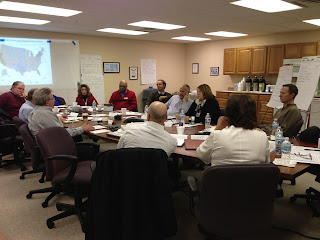On
Thursday, policy makers and advocates met at HVAF of Indiana, Inc. to
discuss changes in homeless veterans programs and services.
More than a dozen people representing the U.S. Department of Veterans Affairs (VA) and Community Based Organizations (CBOs) from throughout the country attended the meeting. The topics they addressed included the Homeless Providers Grant and Per Diem (GPD) Program, which funds transitional (temporary) housing for homeless veterans.
Generally, the meeting group focused on bridging the gap between the VA and service providers. Participants also worked to identify a best model for permanent housing and ongoing case management for eligible homeless veterans.
Stephen Peck, President & CEO of U.S. Vets, a provider of transitional housing and the nation’s largest nonprofit provider of services to homeless and at-risk veterans, says the meeting was called after service providers expressed concerns of being left out of the VA’s decision-making process. Peck is also one of the founders of HVAF of Indiana, Inc.
Lisa Pape, LISW, National Director of Homeless Programs for the Veterans Health Administration (VHA) within the Department of Veterans Affairs (VA) expresses optimism about today’s meeting, saying the VA is on track to meet the White House goal of ending veteran homelessness by 2015.
“I have a sense of renewed energy today,” says Lisa. “We’re coming up with solutions to better serve our homeless veterans, and discussing necessary changes we’ll need to make to serve these veterans, specifically in the Grant and Per Diem Program.
“Simply providing shelter is a quick and easy solution, but one that doesn’t address the deeper causes of homelessness and therefore doesn’t solve the problem,” says HVAF President & CEO Charles Haenlein.
Stephen Peck of U.S. Vets agrees.
“Do we simply house homeless veterans, or do we rehabilitate them? We’re need to be on the rehabilitation side,” adds Stephen.
Meeting participants included representatives from HVAF of Indiana, Volunteers of America, The Jericho Project, U.S. Vets, Vietnam Veterans of San Diego, Veteran Homestead and Swords to Plowshares.
HVAF provides housing to more than 200 previously homeless veterans in a mix of properties and also provides services to an additional 200 homeless veterans each week through outreach. In addition to housing, HVAF provides case management services, food, clothing and veterans’ other basic needs for up t o two years while the veteran becomes self-sufficient.
Friday
Wednesday
Gift of hope: food for veterans during toughest times
 |
| Linda (left) Bob Konieczny (middle) and R.B. (far right) |
He served with the 1st Marine Division, and was stationed at Marine Corps Base Camp Pendleton, Twentynine Palms and Riverside, California.
R.B. is now retired and spends some of his time collecting food and monetary donations for HVAF veterans.
“I was able to get members of Beech Grove American Legion Post 276 behind this important cause of raising awareness and food for HVAF veterans,” says R.B.
So in 2003, he began by setting up a donation station at the post where he asked members to drop off nonperishable items. Once the boxes got full, R.B. then brought them to HVAF to fill its pantry.
But it doesn’t stop there.
Twice a year R.B. and his friends Bob and Linda Konieczny, donate to HVAF roughly $2,000 worth of food through monetary donations from members of the post. R.B. then shops at stores like Save A Lot where he says the group can get the most items for their money.
“This is just a continuation of my military service,” says R.B. “My military career was taking care of others. This is an extension of that. These guys coming to HVAF, most of them just had a little hiccup in their lives and they are trying to get it back together… this goes a long way in helping them get back into the mainstream of life."
R.B. has made it a responsibility to continue helping through donating items to the food pantry. Thanks to the help of R.B. and friends we are able to can hunger for many veterans.
Subscribe to:
Posts (Atom)

